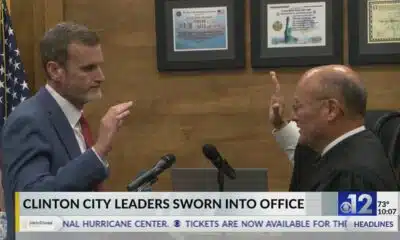Mississippi Today
My grandfather’s law firm just bowed to Trump. It goes against his and America’s values.
Editor’s note: Nina Rifkind is an adjunct professor at the University of Mississippi Law School and the granddaughter of one of the founders of a major national law firm that recently settled a dispute with President Donald Trump. She agreed to write about that settlement and about her grandfather’s story for Mississippi Today Ideas.
Last month, the Trump administration issued an executive order aimed at the New York law firm Paul, Weiss, Rifkind, Wharton and Garrison (known to many as just “Paul, Weiss”).
The order threatened the firm with withdrawal of the security clearances required to do certain legal work as retribution for work Mark Pomerantz, a former Paul, Weiss partner, had done while employed by the Manhattan District Attorney’s office in connection with the investigation of Trump’s businesses. Within days, Paul, Weiss announced that it had struck a deal with the Trump administration, offering, among other things, millions of dollars’ worth of free legal work for administration endorsed causes, and changes in hiring practices in exchange for the dismissal of the executive order.
While I had been angry about many of the acts of this administration that seemed to undermine the very institutions and ideals of American government and society that I had been raised to revere, this one struck particularly close to my heart.
On the one hand, I had no particular interest in the affairs of this law firm, located half a continent away from my home in Mississippi, and to which I had no personal connection except that it was where my grandfather, Simon H. Rifkind, had practiced law until his death at the age of 94 in 1995. On the other hand, it seemed to me that the executive orders addressed to this law firm, and, ultimately, a handful of others, were an assault on my chosen profession, on our legal system and on our democracy as a whole.
So when the chairman of the firm Brad Karp, in defense of the decision to make a deal, cited the firm’s “Statement of Firm Principles,” written by my grandfather in 1963, I contacted my sister, Amy Rifkind, a lawyer practicing in Washington, D.C. We quickly decided to speak out. We did so in the form of a letter to Mr. Karp, explaining that his decision was an affront to those very principles he claimed to defend.
In that letter, we wrote that our grandfather believed that to practice law in this country is a privilege that comes with “responsibilities both to our profession and our country” and a duty “to protect ‘the prizes of our civilization.’” In light of those duties, we noted that, “We are confident that neither our grandfather, nor his colleagues with whom he built Paul, Weiss, would have negotiated a truce for themselves when the rest of the legal profession remains under threat for doing its jobs as lawyers. Consistent with his values, he would have above all sought to protect the independence of the bar, not just the firm.”
READ MORE: The full letter the Rifkind sisters wrote to Brad Karp
In writing the letter, we hoped that our small evocation of our grandfather’s enduring values would inspire others to speak out with their own messages of hope and courage in the face of adversity. We have been simultaneously stunned, humbled and honored by the media outlets (including Mississippi Today) and individuals that have chosen to amplify our message.
My grandfather was born in Russia at the turn of the last century. He often said that he was born and lived in the 16th century until, at the age of 9, he left his little village and immigrated with his mother and sisters to the United States. Before he left, he had never seen a power-driven piece of machinery, experienced running water or worn any factory-made garment. As is the case with many immigrants, he arrived in this country with no ability to speak English, but with a determination to make a home here. And also like many immigrants, by his teens, that determination had developed into a deep sense of patriotism. That love of country continued to develop throughout his life, fueled by his own varied personal and professional experiences.
He served the public in a variety of ways. He served as a legislative aide to Sen. Robert Wagner, helping to draft some of the New Deal legislation that helped stem the effects of the Great Depression. In 1945-46, as an advisor to Generals Eisenhower and McNarney in Europe, he brought to light the horror and despair experienced by hundreds of thousands of residents of the displaced persons camps in the wake of the Nazi genocide. He spent a decade as a federal judge in the Southern District of New York and a year as special master for a multi-state dispute over use of the Colorado River. But even in private practice at Paul, Weiss, where he spent most of his career and where many of his clients were large private corporations, he believed his work should, and did, serve the public good.
We all know that lawyers get a bad rap as they are often described as greedy and predatory. But to hear my grandfather talk about the practice of law, as my sister and I did during our family’s regular Sunday afternoon visits to his apartment throughout our childhood, you would think he was part of the noblest profession in the world. As a fierce defender of our adversarial system, he believed everyone deserved vigorous and ethical counsel, no matter how rich or poor, popular or unpopular. He believed that every client, whether paying top dollar or receiving the benefit of pro bono representation, deserved the highest quality of work his or her lawyer could provide.
And he believed, as he wrote at the end of his life, that “lawyers are licensed beneficiaries of privileges and immunities received as gifts from the community in which they practice and that they hold these gifts in trust for the service of the community.” In other words, all lawyers, regardless of the nature of their practice, who take their roles seriously and perform their duties with skill and integrity, provide a benefit to society.
My grandfather’s life spanned nearly the entirety of the 20th Century — a century that, despite some very dark moments, saw our country lead the charge in achieving the greatest advances in freedom and prosperity in human history. And while he benefited from those advances, he never lost sight of the fact that the foundations of that freedom, equality and prosperity are fragile and dependent on the individual and institutional pillars of our American democracy.
Indeed, in 1954, he wrote: “Every American generation has inherited from its predecessor the memory of freedom, of liberty and of constitutional government; but every generation if it would retain these prizes of our civilization, must reacquire them in its own lifetime. This day when the winds are full of doctrines subversive of the Constitution, inimical to our liberties, is the time to redevelop muscle and determination to defend them. In their defense we shall survive.”
In the most important respects, my family is not unusual. These principles and values were passed down through casual interactions, a commitment to religious and secular traditions and through modeled behavior. We laughed when my grandfather’s views seemed out of touch with the times. And we used his values as a blueprint to form our own paths and priorities.
I assume most of us grew up with at least some influential figures who adhered to and communicated a set of core values, whether explicitly or by example. And I suspect that despite our different backgrounds and experiences, if we examine those values closely, we will find that there is more that unifies us than divides us.
My sister and I wrote the letter to Mr. Karp as a reminder of what Paul, Weiss’s stated “principles” really mean for the legal profession and for American democracy. In doing so, we revisited those core beliefs ourselves, and hopefully inspired others to as well.
Perhaps, with such values in mind, we can rise above the destructive forces of greed, cynicism and selfish grievance, remember that together we are more than the sum of our parts, and continue our collective march toward freedom, equality and prosperity.
Nina Rifkind is a graduate of Yale College and New York University School of Law. Following law school, she practiced law first in New York and later in Los Angeles. Since moving to Oxford, she has continued to practice in a variety of capacities, most recently as an independent contract attorney and is an adjunct professor at the University of Mississippi Law School, where she teaches the Law and Religion course. She has taught legal writing at the USC Gould School of Law and Advanced Legal Writing at the University of Mississippi. She currently serves on the boards of the Jewish Federation of Oxford and the Oxford School District Foundation.
This article first appeared on Mississippi Today and is republished here under a Creative Commons Attribution-NoDerivatives 4.0 International License.
Mississippi Today
Trump nominates Baxter Kruger, Scott Leary for Mississippi U.S. attorney posts
President Donald Trump on Tuesday nominated Baxter Kruger to become Mississippi’s new U.S. attorney in the Southern District and Scott Leary to become U.S. attorney for the Northern District.
The two nominations will head to the U.S. Senate for consideration. If confirmed, the two will oversee federal criminal prosecutions and investigations in the state.
Kruger graduated from the Mississippi College School of Law in 2015 and was previously an assistant U.S. attorney for the Southern District. He is currently the director of the Mississippi Office of Homeland Security.
Sean Tindell, the Mississippi Department of Public Safety commissioner, oversees the state’s Homeland Security Office. He congratulated Kruger on social media and praised his leadership at the agency.
“Thank you for your outstanding leadership at the Mississippi Office of Homeland Security and for your dedicated service to our state,” Tindell wrote. “Your hard work and commitment have not gone unnoticed and this nomination is a testament to that!”
Leary graduated from the University of Mississippi School of Law, and he has been a federal prosecutor for most of his career.
He worked for the U.S. Attorney’s Office in the Western District of Tennessee in Memphis from 2002 to 2008. Afterward, he worked at the U.S. Attorney’s Office for the Northern District of Mississippi in Oxford, where he is currently employed.
Leary told Mississippi Today that he is honored to be nominated for the position, and he looks forward to the Senate confirmation process.
This article first appeared on Mississippi Today and is republished here under a Creative Commons Attribution-NoDerivatives 4.0 International License.
The post Trump nominates Baxter Kruger, Scott Leary for Mississippi U.S. attorney posts appeared first on mississippitoday.org
Note: The following A.I. based commentary is not part of the original article, reproduced above, but is offered in the hopes that it will promote greater media literacy and critical thinking, by making any potential bias more visible to the reader –Staff Editor.
Political Bias Rating: Centrist
This article presents a straightforward news report on President Donald Trump’s nominations of Baxter Kruger and Scott Leary for U.S. attorney positions in Mississippi. It focuses on factual details about their backgrounds, qualifications, and official responses without employing loaded language or framing that favors a particular ideological perspective. The tone is neutral, with quotes and descriptions that serve to inform rather than persuade. While it reports on a political appointment by a Republican president, the coverage remains balanced and refrains from editorializing, thus adhering to neutral, factual reporting.
Mississippi Today
Jackson’s performing arts venue Thalia Mara Hall is now open
After more than 10 months closed due to mold, asbestos and issues with the air conditioning system, Thalia Mara Hall has officially reopened.
Outgoing Mayor Chokwe A. Lumumba announced the reopening of Thalia Mara Hall during his final press conference held Monday on the arts venue’s steps.
“Today marks what we view as a full circle moment, rejoicing in the iconic space where community has come together for decades in the city of Jackson,” Lumumba said. “Thalia Mara has always been more than a venue. It has been a gathering place for people in the city of Jackson. From its first class ballet performances to gospel concerts, Thalia Mara Hall has been the backdrop for our city’s rich cultural history.”
Thalia Mara Hall closed last August after mold was found in parts of the building. The issues compounded from there, with malfunctioning HVAC systems and asbestos remediation. On June 6, the Mississippi State Fire Marshal’s Office announced that Thalia Mara Hall had finally passed inspection.
“We’re not only excited to have overcome many of the challenges that led to it being shuttered for a period of time,” Lumumba said. “We are hopeful for the future of this auditorium, that it may be able to provide a more up-to-date experience for residents, inviting shows that people are able to see across the world, bringing them here to Jackson. So this is an investment in the future.”
In total, Emad Al-Turk, a city contracted engineer and owner of Al-Turk Planning, estimates that $5 million in city and state funds went into bringing Thalia Mara Hall up to code.
The venue still has work to be completed, including reinstalling the fire curtain. The beam in which the fire curtain will be anchored has asbestos in it, so it will have to be remediated. In addition, a second air-conditioning chiller needs to be installed to properly cool the building. Until it’s installed, which could take months, Thalia Mara Hall will be operating at a lower seating capacity of about 800.
“Primarily because of the heat,” Al-Turk said. “The air conditioning would not be sufficient to actually accommodate the 2,000 people at full capacity, but starting in the fall, that should not be a problem.”
Al-Turk said the calendar is open for the city to begin booking events, though none have been scheduled for July.
“We’re very proud,” he said. “This took a little bit longer than what we anticipated, but we had probably seven or eight different contractors we had to coordinate with and all of them did a superb job to get us where we are today.”
This article first appeared on Mississippi Today and is republished here under a Creative Commons Attribution-NoDerivatives 4.0 International License.
The post Jackson’s performing arts venue Thalia Mara Hall is now open appeared first on mississippitoday.org
Note: The following A.I. based commentary is not part of the original article, reproduced above, but is offered in the hopes that it will promote greater media literacy and critical thinking, by making any potential bias more visible to the reader –Staff Editor.
Political Bias Rating: Centrist
The article presents a straightforward report on the reopening of Thalia Mara Hall in Jackson, focusing on facts and statements from city officials without promoting any ideological viewpoint. The tone is neutral and positive, emphasizing the community and cultural significance of the venue while detailing the challenges overcome during renovations. The coverage centers on public investment and future prospects, without partisan framing or editorializing. While quotes from Mayor Lumumba and a city engineer highlight optimism and civic pride, the article maintains balanced, factual reporting rather than advancing a political agenda.
Mississippi Today
‘Hurdles waiting in the shadows’: Lumumba reflects on challenges and triumphs on final day as Jackson mayor
On his last day as mayor of Jackson, Chokwe Antar Lumumba recounted accomplishments, praised his executive team and said he has no plans to seek office again.
He spoke during a press conference outside of the city’s Thalia Mara Hall, which was recently cleared for reopening after nearly a year of remediation. The briefing, meant to give media members a peek inside the downtown theater, marked one of Lumumba’s final forays as mayor.
Longtime state Sen. John Horhn — who defeated Lumumba in the Democratic primary runoff — will be inaugurated as mayor Tuesday, but Lumumba won’t be present. Not for any contentious reason, the 42-year-old mayor noted, but because he returns to his private law practice Tuesday.
“I’ve got to work now, y’all,” Lumumba said. “I’ve got a job.”
Thalia Mara Hall’s presumptive comeback was a fitting end for Lumumba, who pledged to make Jackson the most radical city in America but instead spent much of his eight years in office parrying one emergency after another. The auditorium was built in 1968 and closed nearly 11 months ago after workers found mold caused by a faulty HVAC system – on top of broken elevators, fire safety concerns and vandalism.
“This job is a fast-pitched sport,” Lumumba said. “There’s an abundance of challenges that have to be addressed, and it seems like the moment that you’ve gotten over one hurdle, there’s another one that is waiting in the shadows.”
Outside the theater Monday, Lumumba reflected on the high points of his leadership instead of the many crises — some seemingly self-inflicted — he faced as mayor.
He presided over the city during the coronavirus pandemic and the rise in crime it brought, but also the one-two punch of the 2021 and 2022 water crises, exacerbated by the city’s mismanagement of its water plants, and the 18-day pause in trash pickup spurred by Lumumba’s contentious negotiations with the city council in 2023.
Then in 2024, Lumumba was indicted alongside other city and county officials in a sweeping federal corruption probe targeting the proposed development of a hotel across from the city’s convention center, a project that has remained stalled in a 20-year saga of failed bids and political consternation.
Slated for trial next year, Lumumba has repeatedly maintained his innocence.
The city’s youngest mayor also brought some victories to Jackson, particularly in his first year in office. In 2017, he ended a furlough of city employees and worked with then-Gov. Phil Bryant to avoid a state takeover of Jackson Public Schools. In 2019, the city successfully sued German engineering firm Siemens and its local contractors for $89 million over botched work installing the city’s water-sewer billing infrastructure.
“I think that that was a pivotal moment to say that this city is going to hold people responsible for the work that they do,” Lumumba said.
Lumumba had more time than any other mayor to usher in the 1% sales tax, which residents approved in 2014 to fund infrastructure improvements.
“We paved 144 streets,” he said. “There are residents that still are waiting on their roads to be repaved. And you don’t really feel it until it’s your street that gets repaved, but that is a significant undertaking.”
And under his administration, crime has fallen dramatically recently, with homicides cut by a third and shootings cut in half in the last year.
Lumumba was first elected in 2017 after defeating Tony Yarber, a business-friendly mayor who faced his own scandals as mayor. A criminal justice attorney, Lumumba said he never planned to seek office until the stunning death of his father, Chokwe Lumumba Sr., eight months into his first term as mayor in 2014.
“I can say without reservation, and unequivocally, we remember where we started. We are in a much better position than we started,” Lumumba said.
Lumumba said he has sat down with Horhn in recent months, answered questions “as extensively as I could,” and promised to remain reachable to the new mayor.
This article first appeared on Mississippi Today and is republished here under a Creative Commons Attribution-NoDerivatives 4.0 International License.
The post 'Hurdles waiting in the shadows': Lumumba reflects on challenges and triumphs on final day as Jackson mayor appeared first on mississippitoday.org
Note: The following A.I. based commentary is not part of the original article, reproduced above, but is offered in the hopes that it will promote greater media literacy and critical thinking, by making any potential bias more visible to the reader –Staff Editor.
Political Bias Rating: Center-Left
The article reports on outgoing Jackson Mayor Chokwe Antar Lumumba’s reflections without overt editorializing but subtly frames his tenure within progressive contexts, emphasizing his self-described goal to make Jackson “the most radical city in America.” The piece highlights his accomplishments alongside challenges, including public crises and a federal indictment, maintaining a factual tone yet noting contentious moments like labor disputes and governance issues. While it avoids partisan rhetoric, the focus on social justice efforts, infrastructure investment, and crime reduction, as well as positive framing of Lumumba’s achievements, aligns with a center-left perspective that values progressive governance and accountability.
-
Mississippi Today6 days ago
Defendant in auditor’s ‘second largest’ embezzlement case in history goes free
-
News from the South - Georgia News Feed5 days ago
Are you addicted to ‘fridge cigarettes’? Here’s what the Gen Z term means
-
The Conversation6 days ago
Toxic algae blooms are lasting longer than before in Lake Erie − why that’s a worry for people and pets
-
News from the South - Tennessee News Feed6 days ago
5 teen boys caught on video using two stolen cars during crash-and-grab at Memphis gas station
-
Local News6 days ago
St. Martin trio becomes the first females in Mississippi to sign Flag Football Scholarships
-
Local News7 days ago
Mississippi Power shares resources and tips for lowering energy bill in the summer
-
News from the South - Kentucky News Feed7 days ago
Error that caused Medicaid denials has been corrected, says cabinet in response to auditor letter
-
News from the South - Georgia News Feed7 days ago
GOP mega-bill stuck in US Senate as disputes grow over hospitals and more


















































